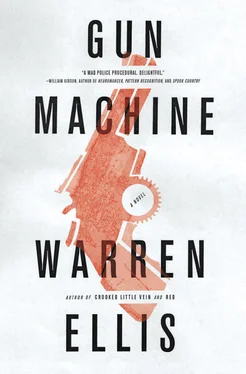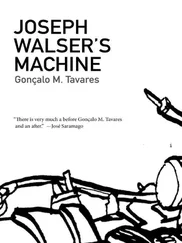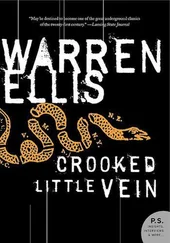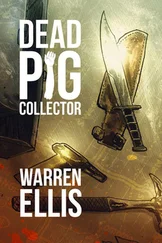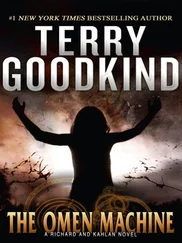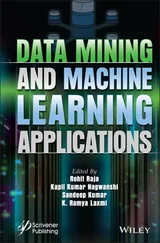The hunter slipped the gloves on, and then the ring.
Draining Mannahatta from his sight with reluctance, he began to pick his way through warehouses, gray-mud parking lots, and auto repair shops. It was, he felt, as desolate as this end of the island got.
He found the location he wanted: a five-story building whose frontage was a boarded-up pizzeria. The side door, which opened onto the stairs going up to the higher floors of the building, was, as ever, slightly ajar. One presented oneself in front of it, at which event the door would creak open to reveal a large man with a badly concealed gun standing in its lee.
And so it was that the door swung to show, in the gloom, a grotesque in a grubby orange tracksuit, dark hair growing patchily out of a head that appeared to have at some point fallen in, or been held in, farming machinery. It was as if his face were once a soft thing that someone had swirled with a finger before it had set.
“I want to see Mr. Kutkha,” the hunter said.
“Ain’t no Kutkha here,” the grotesque said, predictably.
“Tell him a previous customer and distant old tribesman has come to visit.”
“Got a name?”
“Tell him you asked for a name and that I told you I’m a human being.”
The grotesque shrugged and walked up the short flight of stairs backward, keeping his hand on the gun shoved in the back of his waistband. At the landing, still keeping his deep-set eyes on the hunter, he relayed the information.
The hunter presently heard a laugh like bones being rattled in a tin, and then a harsh, snapping voice shouting “Let him in, let him in!” The grotesque summoned the hunter up with a paw whose shape was lost to flab. On the landing, the hunter saw a second man, shorter than the grotesque, with a military haircut. His body was overtrained in the manner of the modern physical narcissists, speaking of a man who knew the names of most of his muscles. This one held out a hand for the hunter’s bag, which he passed over easily. The hunter was silently directed to the door of the largest room on this floor, a room that hummed with the sound of machines. It did not quite smother a sudden composition of sounds from the next floor up: screams like a cat being dismembered, a deep thump that shook the ceiling, the noise of someone trying to cry while unable to draw breath.
The hunter showed no outward sign of having heard it. He allowed the man with the military haircut to pat him down.
The first thing the hunter noticed upon entering the room was a boy of sixteen, low-browed and broad-nosed, standing beside the door with the expression of a soundly beaten puppy. The hunter could not see the boy’s hands, and so he moved to kill the boy.
Kutkha’s voice stopped him. “Boy! You do not stand there when a true man enters a room! Do you want to die?”
Kutkha was thin like a switch, with a face flaked from flint. He sat with kingly aplomb upon a small, richly buttery sofa, flanked by two tall fans attendant on either side of his seat, with two floor-standing air-conditioning units on the floor before him like kneeling slaves. The hunter knew Kutkha of old: the man complained of being permanently hot, yet he loved clothes, and so he sat there in peculiar long shorts of fine cotton and white silk and an elaborately patterned waistcoat and nothing else, being delightedly hammered by the tundra gales of very new air-conditioning machines.
Kutkha was still cackling at the boy’s frozen horror as he rose to shake the hunter’s hand. “The human being himself! My distant relation!”
And then, to the boy: “A human being, see? He is of the Lenni-Lenape tribe. Do you know what those words mean? The ‘Human Beings!’ He and I, we are of the same blood. Your family?” He spit on the floor. “Your family are shit.”
Kutkha turned back to the hunter. “My brother fucked a Muscovite. What can you do. Some people will fuck livestock if the animals stand still long enough. That family, they continue to send these little sperms up the B to beg me to make nice, come to Brighton Beach, eat kielbasa they made out of fucking dogs, and listen to them talk about how I can give them all my fucking money. Those people have been fucking my people for so long that you could look right into my very fucking DNA with a microscope and see someone from Moscow pissing on my genes and calling it summer rain.”
Kutkha rounded again on the hapless boy. “Do you see? I am Itelmen! My people walked to Alaska and down into America and became his people! He is more my blood than you. You are like the things that fall out of my ass when I eat Italian foods.”
Kutkha returned to his seat. There wasn’t another chair in the room, but the hunter was expecting this. He knew Kutkha. He stood between the air-con units, a supplicant position before the throne. The hunter had harbored some small stone of regret about what would have to happen. It turned to dust in his heart as he stood there like a peasant between the rumbling little machines.
The Russian waved an airy hand at the boy. “You can speak in front of him. I am not even convinced he knows the language.”
The hunter studied the boy briefly, and then decided to speak. “I need a gun. I would very much like a police gun.”
“How so?”
“A gun associated with the police. With use by the police.”
Kutkha addressed the sullen boy. “He’s a collector, see. Knows what he wants, knows what he likes. A man with an interest in history. You could cultivate that shit. Know where you’ve been and you’ll see where you’re going. You might be of some use to me if you could prove you could think. Or count. You do not have to go back to Brighton Beach and get jerked off by old men in piss-stinking banyas. I’ll say that I can teach you things here in Manhattan that have been long forgotten in Brighton Beach.”
The hunter said, “It doesn’t have to be new. I’d prefer something in working condition.”
“You know.” Kutkha ruminated. “I’m almost positive I have a Colt Official Police. From the 1950s.”
“What does the grip look like?”
“Checkered wood.”
“And the barrel?”
“Six inches, I would say. I remember this because my specialist, he likes history like we do, and he saw this gun and made the little rocking motion that means he is happy, and told me many things about the gun until I had to say to him that I would shoot him to make him quiet again.”
“I’ll take that,” said the hunter.
“A fine purchase. A weapon like that, it’s like a good watch, from the days when they still had mechanical parts that people cared about. I could have maybe found you a SIG, but it’s simply not the same, is it? The Colt comes with the original NYPD holster, but I’ll not sell you that. If you want it, it’s free, but I’ll not take your money for it.”
“Why?”
“It hasn’t been used. It’s a spare holster. And I will tell you a thing that I was told by my specialist, because it amused me. Policemen had to break in those holsters. They looked like leather but were just treated cardboard. So they had to force a Coke bottle into the holster for a week to loosen it enough to get the gun in. If you put the gun in there without breaking it in, you had to cut the gun out again. Or get shot. But breaking it in did so much damage that the holster would fall apart after six months. I am told this: in the 1970s, men of our kind could rip the Colts right out of the holsters. Just tear the holsters, pull the gun, and shoot the policeman. Those were sweeter times, if you ignored the clothes.”
The hunter clamped down on the thoughts and actions boiling in his gut. “How much?”
“I will not accept more than one hundred dollars for this gun,” said Kutkha, chest swelling with pride in his own magnanimity. “It will come with twenty-four rounds of ammunition.”
Читать дальше
